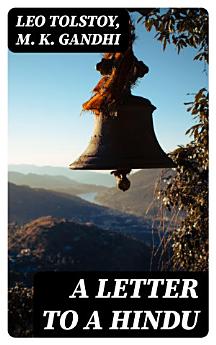A Letter to a Hindu
नव॰ 2022 · DigiCat
ई-बुक
38
पेज
family_home
योग्य
info
reportरेटिंग और समीक्षाओं की पुष्टि नहीं हुई है ज़्यादा जानें
इस ई-बुक के बारे में जानकारी
In 'A Letter to a Hindu,' the thematic exploration revolves around the nature of colonialism, the spiritual underpinnings of nonviolence, and the potential for human unity despite vast cultural divides. This anthology presents an inspiring array of literary styles, presenting philosophical discourses alongside impassioned pleas for societal change. The collection's significance lies not only in its historical context but also in its timeless relevance, as it confronts power dynamics that continue to resonate globally. Within its pages, readers encounter both poignant narratives and contemplative essays that provoke introspection and dialogue about the human condition. This anthology brings together influential thinkers, Leo Tolstoy and M. K. Gandhi, whose lives and works have significantly shaped the realms of literature and social movements. As icons of non-violent resistance and advocates of truth and morality, both authors contribute profoundly to the themes discussed, drawing from their diverse cultural backgrounds. Tolstoy's engagement with Christian anarchism and Gandhi's embodiment of Satyagraha blend harmoniously, offering a rich tapestry of insights that expand on these movements. Their collective works in this collection highlight insightful perspectives and challenge conventional thought, ultimately advocating for transformative social and personal change. 'A Letter to a Hindu' is a remarkable compendium recommended for those seeking a profound educational experience and broader understanding of peaceful resistance. This anthology uniquely affords readers a journey into the complex interplay between Western and Eastern traditions, underscoring its role in promoting critical reflection and societal evolution. By engaging with these multifaceted discourses, readers are invited to appreciate the rich dialogue that the symbiosis of thought between Tolstoy and Gandhi fosters, ensuring its continued relevance in contemporary discussions of peace and activism.
लेखक के बारे में
Count Lev Nikolayevich Tolstoy, known as Leo Tolstoy, was a towering figure in Russian literature and is widely considered one of the greatest novelists of all time. Born into Russian nobility on September 9, 1828, in Yasnaya Polyana, Tolstoy's experiences with loss and educational endeavors profoundly shaped his philosophical and literary trajectory. His works are notable for their intricate character development, moral introspection, and detailed observations of 19th-century Russian life. Tolstoy's literary mastery is exemplified in his epics, 'War and Peace' (1865–1869) and 'Anna Karenina' (1877). Beyond his novels, he also wrote compelling short stories, essays, and plays. His foray into the epistolary genre includes 'A Letter to a Hindu' (1908), wherein he expounds on non-violent resistance, reflecting his late-life turn to spiritual and ethical issues. In parallel with Mahatma Gandhi's principles, Tolstoy's advocacy for non-violence influenced political activism around the world. His didactic works, such as 'The Kingdom of God Is Within You' (1894), further illustrate his philosophical stance against the Orthodox Church and government, promoting instead Christian anarchism. Tolstoy's literary style is marked by his use of realism, exploration of existential anxiety, and commentary on social injustices. He died on November 20, 1910, leaving a legacy of works that continue to provoke thought and emotion in an unending dialogue about the human condition.
इस ई-बुक को रेटिंग दें
हमें अपनी राय बताएं.
पठन जानकारी
स्मार्टफ़ोन और टैबलेट
Android और iPad/iPhone के लिए Google Play किताबें ऐप्लिकेशन इंस्टॉल करें. यह आपके खाते के साथ अपने आप सिंक हो जाता है और आपको कहीं भी ऑनलाइन या ऑफ़लाइन पढ़ने की सुविधा देता है.
लैपटॉप और कंप्यूटर
आप अपने कंप्यूटर के वेब ब्राउज़र का उपयोग करके Google Play पर खरीदी गई ऑडियो किताबें सुन सकते हैं.
eReaders और अन्य डिवाइस
Kobo ई-रीडर जैसी ई-इंक डिवाइसों पर कुछ पढ़ने के लिए, आपको फ़ाइल डाउनलोड करके उसे अपने डिवाइस पर ट्रांसफ़र करना होगा. ई-रीडर पर काम करने वाली फ़ाइलों को ई-रीडर पर ट्रांसफ़र करने के लिए, सहायता केंद्र के निर्देशों का पालन करें.








